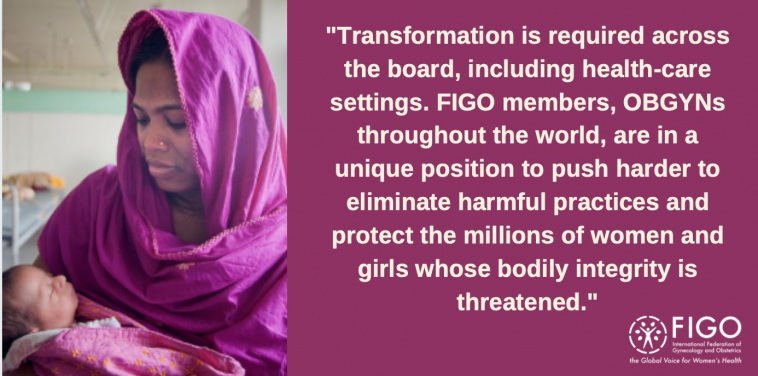Defying harmful practices
This week FIGO attended the UK launch of UNFPA’s latest State of World Population (SWOP) report, Against My Will: Defying the Practices that Harm Women and Girls and Undermine Equality.

“She’s a girl, which means that, despite her inherent human rights, her body, her life and her future are not her own. We live in a world where so many dimensions of power and choice are still determined by gender. Most women and girls face some, if not many, discriminatory barriers to equality. Among the many causes and consequences of gender discrimination, harmful practices rank as some of the most insidious.” UNFPA State of the World Population Report (SWOP) 2020
Harmful practices such as child marriage and FGM are widespread and can be found in every region of the world, in both high income and low-middle income nations.
Last year, at the Nairobi Summit on ICPD25, representatives from governments, grassroots organisations, development agencies and the private sector moved beyond pledges and resolutions and committed to ending the unmet need for contraceptives, ending preventable maternal death, and ending gender-based violence and harmful practices. FIGO made our own ICPD commitment to address Violence Against Women and Girls.
While progress has been made to end some harmful practices worldwide, the COVID-19 pandemic threatens to reverse these hard won gains. UN Women reported a global rise in domestic violence cases during lockdown and new evidence released by UNFPA revealed that for every 3 months the lockdown continues an additional 15 million cases of gender-based violence are expected.
UNFPA’s SWOP report 2020 reminds us that we can remain positive because of on the ground efforts which have changed behaviours, values and norms: “There are indications that members of a younger generation of girls, more aware of their rights, are rejecting harmful practices as never before (UNICEF, 2020). There is longstanding global agreement on ending them, and men and boys are increasingly challenging gender inequality and advocating changes that benefit everyone (Commission on the Status of Women, 2020)."
In the introduction to the report Dr. Natalia Kanem outlines:
“Getting to zero may prove difficult, yet I have no doubt it is achievable. After all, some harmful practices have persisted over centuries. Yet change will—and must—come. The first step in changing attitudes and social norms is educating parents about the consequences harmful practices have for their daughters and about the benefits that accrue to families and communities when girls are healthy and empowered, and their rights are respected."
Dr Faith Mwangi-Powell, CEO at Girls Not Brides confirmed this during the panel session:
“I met a girl in India who told me she run away from child marriage, because she believed she was born to be much more than a child bride - she inspires me every day and we must work together to end child marriage." During the panel session Faith also outlined “If we can reach the communities, if we can reach the parents,” we will see real change.
Attendees at FIGO 2018 in Rio also heard this. When she was only eight, Nice Nailantei Leng’ete and her older sister escaped the cut by running away and hiding in a tree all night, before being found by their uncles and beaten. Today, Nice is an advocate to end female genital mutilation/cutting (FGM/C), and a project officer at Amref Health Africa.
Hear her powerful story:
FIGO’s Honorary Secretary Prof. Dame Lesley Regan asked the panel:
“I know that there’s an appetite for asking ‘Please let me know what I can do to help?’”
Dr Faith Mwangi-Powell responded, “We know what needs to be done. We must now work together. We must change the narrative - how girls are valued.”
Dr. Natalia Kanem highlighted, “Ask men to use their privilege to demand equal rights for women and girls.”
For FIGO members, there is a lot that can be done to address the harmful consequences of FGM.
FIGO stands by our 1994 General Assembly Resolution where we recognised that Female Genital Mutilation is a violation of human rights, as a harmful procedure performed on a child who cannot give informed consent. In our commitments we asked members to:
- Urge their governments to ratify the Convention on the Elimination of ALL Forms of Discrimination Against Women.
- Explain the dangers of FGM.
- Educate health professionals, community workers and teachers about this harmful traditional practice.
- Support men and women who want to end the practice.
- Assist in research for the documentation of the prevalence of the practice and its harmful consequences.
- Oppose any attempt to medicalise the procedure or to allow its performance, under any circumstances, in health establishments or by health professionals.
UNFPA’s 2020 SWOP ‘Against My Will: Defying the Practices that Harm Women and Girls and Undermine Equality’ is a timely report, as we aim to ramp up our efforts in the “Decade of Action” to achieve the 2030 Agenda for Sustainable Development, including SDGs target 5.3 – ‘Eliminate all harmful practices, such as child, early and forced marriage and female genital mutilation.'
The report expresses a sense of urgency, full of shocking statistics about equally shocking practices.
What can we do to help? Asked Prof. Dame Lesley Regan.
Dr. Natalia Kanem highlights, “Armed with knowledge, backed by international human rights agreements, and buoyed by new commitments by governments and civil society, we have the power to defy the forces that perpetuate harm and to realise a world where every woman and girl is free to chart her own future."
Transformation is required across the board, including health-care settings that intersect with values and norms that still sanction violence against women and girls, and deny them their rights and bodily autonomy.
FIGO members, OBGYNs throughout the world, are in a unique position to push harder to eliminate these harmful practices and protect the millions of women and girls whose bodily integrity is threatened.
Let’s recommit to doing so today.